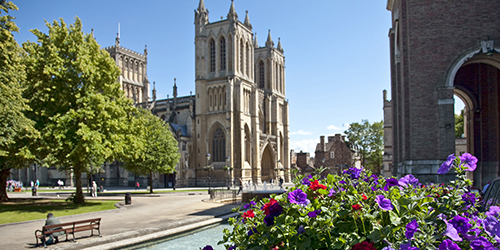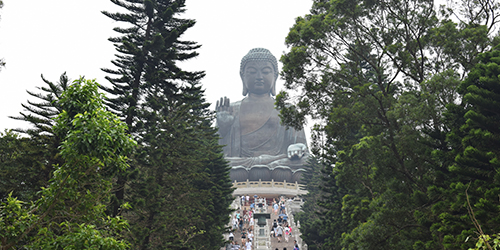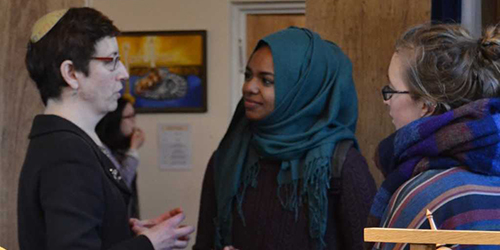Religion and Theology
Our expert academics will help you to understand how religion shapes the world, as you explore major themes of philosophy, ethics, mysticism and power across various religions.
Follow your passions
You have the flexibility to specialise or study broadly across many areas. You can study Sanskrit, Hebrew, Greek, Latin, Japanese or Chinese.
Global connections
You can spend a semester studying at one of our world-renowned partner institutions in Asia, Australia, Canada, the US or Europe - or spend a year overseas on the MArts course.
Real-world relevance
In your final-year, you can carry out fieldwork or a community placement, giving you the chance to research living or past religious communities either locally or further afield.
Religion and Theology courses for 2025
Single Honours
Joint Honours
Religion and Theology at Bristol
We believe that the place of religion in the world can be best understood by examining it from a variety of disciplinary perspectives. Our approach includes historical, philosophical, theological, literary, textual, anthropological, and comparative methodologies.
At Bristol you can study Buddhism, Christianity, Hinduism, Islam, Judaism, Chinese and Japanese religions, and philosophy of religion. A strength of our department is the balanced provision and variety of expertise across both eastern and western religious traditions.
Studying at the Department of Religion and Theology, I encountered a well-rounded, academically challenging, intellectually stimulating and personally enriching university experience that developed in me the skills and capacities to pursue anything I wanted to. For me, this is a career in law.
Career prospects

The breadth of our degrees will give you skills in writing, oral presentation and independent research. You will also benefit from training in the critical and analytical skills common to humanities degrees. Employers place great value on the transferable skills that our graduates gain, including the ability to think creatively, write fluently and appreciate ideas and opinions.
Our graduates are equipped to pursue a variety of careers, including many not directly related to religion. Our students go on to work in fields as diverse as journalism, law, publishing, teaching, alternative technologies, communication, arts and entertainment, while some continue to postgraduate study.
Course structure

In the first year, you will consider important questions in the academic investigation of religion. Mandatory units introduce major world religions and the various academic disciplines involved in their study. You can choose optional units in any year, including introductory language modules such as Greek or Sanskrit.
In your second year, mandatory units build on your first-year study of eastern and western religious traditions and disciplinary debates. You will also take optional units, and you have the opportunity to spend a semester studying abroad. To find out more about studying abroad, visi the Centre for Study Abroad.
MArts students will spend their third year studying at one of our partner universities overseas, returning to Bristol for their final year.
In your final year, you will take optional units that focus on particular religious traditions and broader themes. You will also write a dissertation on a topic of your choice, with the option of combining this with fieldwork (we provide training workshops in fieldwork skills).
You may also choose to combine your religion and theology studies with philosophy; the joint honours BA Philosophy and Theology degree is equally weighted across both subjects.
- Atheism
- Zen Buddhism
- Political Islam
- Religion and Material Culture
- Greco-Roman Judaism
- Sex, Humour, and Piety: Life in the Medieval Buddhist Monastery
- The Body, gender and Religion.
A welcoming community

Bristol is home to many places of worship. We work with venues across the city such as Bristol Cathedral, the Bristol Hindu Temple, Bristol Jamia Mosque, Park Row Synagogue, St Mary Redcliffe Church and St Paul's Church.
Our student-run Religion and Theology society provides a forum for discussion of relevant topics, peer-led academic support and a friendly space to socialise. You can also participate in the activities of the University's faith-based societies and the Multifaith Chaplaincy, where people of all faiths and none mingle and talk.
